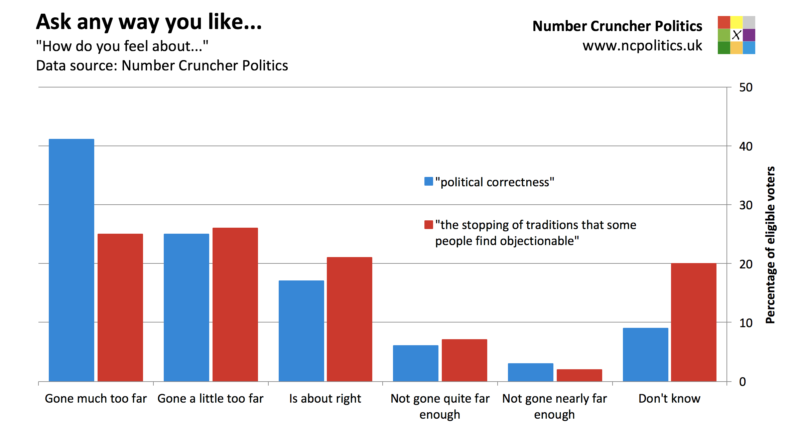Where does public opinion stand on political correctness? We asked the public how they felt about political correctness, among other topics, on a five-point scale ranging between “Not gone nearly far enough” and “Gone much too far”.
Sixty-six per cent think political correctness has gone either much too far (42 per cent) or a little too far (25 per cent). Nine per cent think that it has not gone far enough, with 17 per cent answering “about right”.
“Too far” has a majority in every political, geographic and demographic group apart from under-25s. But even among the youth, there is little evidence of “generation snowflake”, with “too far” 20 points ahead of “not far enough” (37-17).
It is important to consider whether two in three members of the public are simply averse to the words “political correctness”, or the concept itself.
Indeed, there’s been a lot of debate recently about how pollsters ask questions. There will always be wrong ways to probe public opinion, but there is rarely a single right way. And when the topic at hand is controversial, getting the question right becomes harder, and more likely to be scrutinised.
And so it is with political correctness. This culture war battleground is highly contentious. Even the phrase itself is the subject of fierce debate, with some claiming it is has become little more than a term of derision used to stifle efforts to promote equality.
That may be an exaggeration. There is, of course, the “political correctness gone mad” cliche. But a look at its broader usage suggests significant acceptance by neutral sources, both in the media and elsewhere.
The BBC, for example, includes a political correctness programme category, and numerous other uses of the term without quotation marks, as do various other media sites, academic publications, pollsters’ websites and court judgements. Waterstones has a PC section in its online book shop. And qualitative researchers tell me that the term (and the topic itself) increasingly arises unprompted in focus groups.
Other polling suggests that public opinion on political correctness is about more than a phrase with negative connotations. A recent YouGov poll found that 67 per cent felt that “Too many people are easily offended these days over the language that others use” came closer to their view than “People need to be more careful about the language they use to avoid offending people with different backgrounds”.
The question format is different, with no “neutral” option available, and it may be that avoiding the phrase itself results in more people choosing the pro-PC option. But a 2-to-1 finding is hard to interpret as anything other than a decisive anti-PC majority.
Across the Atlantic, the 2016 American National Election Study found 58 per cent thinking that people were too easily offended. Americans generally give answers less hostile to political correctness than Brits do, although it could be argued the United States is less PC than the UK and that the explanation lies there.
Our poll also asked about something associated with political correctness: traditions that have fallen by the wayside. Using the same five-point scale, we asked how people felt about “the stopping of traditions that some people find objectionable”.
On this question, 51 per cent said “too far”, 9 per cent “not far enough” and 21 per cent “about right”. The overall pattern of results is similar to our first question, but with many more don’t knows.

We didn’t ask people to be specific regarding the un-PC traditions they would like to keep. But if, as qualitative research has suggested, it means different things to different people, then that in itself would be important. People’s bugbears might not be any one “big” thing, but if a lot of people can point to something they like that has been stopped or banned, then the ground becomes fertile for sweeping narratives.
To borrow a US example, Donald Trump’s promise to end the “war on Christmas” – implying that his predecessor had avoided “Merry Christmas” in favour of “Happy Holidays” – was popular with Trump supporters, not because it was accurate (it wasn’t, as video evidence confirms) but because it chimed with how they felt in general about the cultural direction their country was taking.
Right now Britain is bitterly divided, with the public split on many issues. Poll findings as lopsided as these are pretty rare. And it is hard to think of an issue on which the tone of debate within elite circles diverges so sharply from public opinion.
Is it possible that by going to great lengths to avoid causing offense, the political bubble, the media and the corporate world have offended others?
What we can say is that PC-fatigue is well advanced. It’s possible that the phrase may be more unpopular than the concept. But it’s not just the phrase. However you word the question, the 2018 version of political correctness really isn’t popular.


